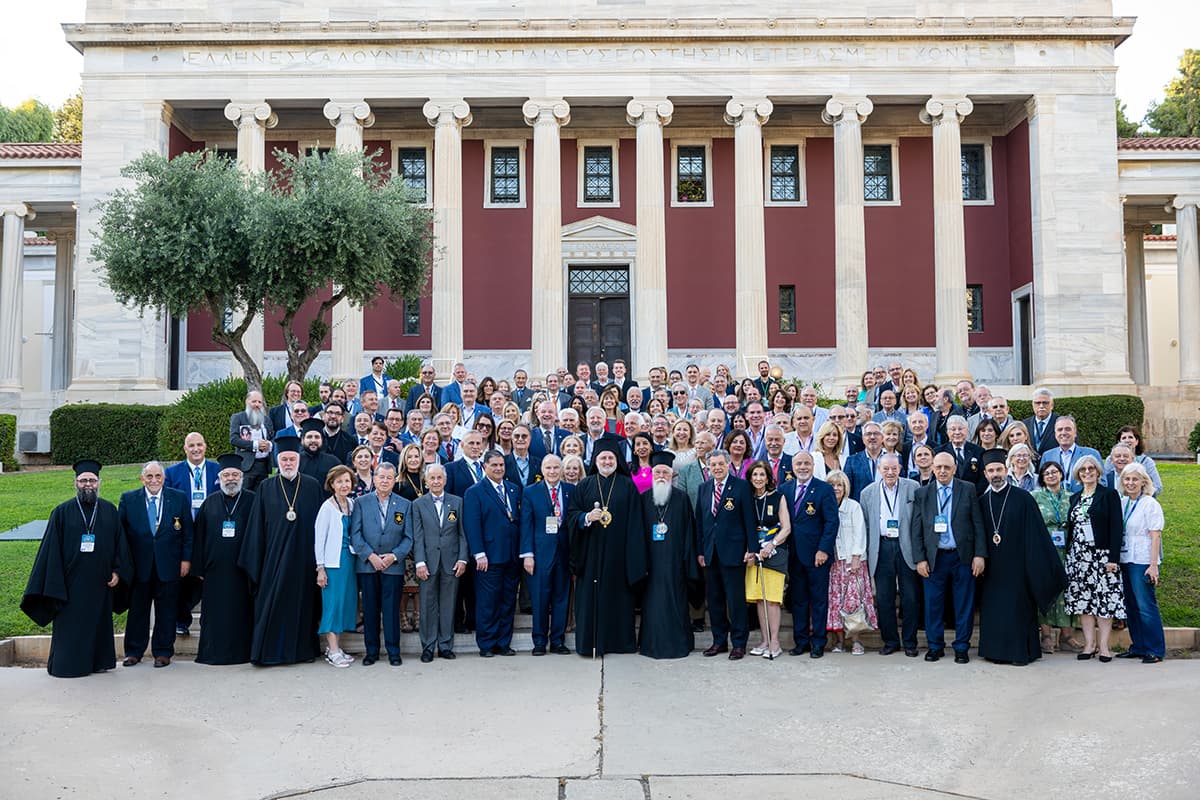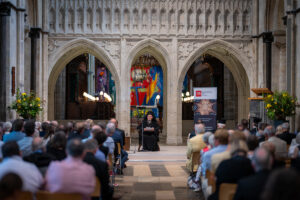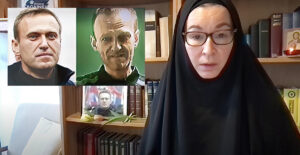On Tuesday evening, May 28, 2024, participants in the 4th Archon International Conference on Religious Freedom attended a cocktail reception at the American School of Classical Studies at Athens. Conference attendees were introduced to the remarkable work that the American School is doing to preserve Greece’s rich heritage, which is part of the cultural patrimony of the entire world.
George T. Orfanakos, Executive Director of the American School of Classical Studies at Athens, noted that the school was founded in 1881. Since then, it has striven to preserve, protect, and promote Greece’s historical past. Mr. Orfanakos referred to the Gospel for the Sunday of the Paralytic, which was read on the day the Conference began. In it, the paralytic tells the Lord Jesus that he has no one to help him, and had waited decades to be healed. The Lord then heals him. By attending in the 4th Archon International Conference on Religious Freedom, Mr. Orfanakos continued, participants were stepping forward, as Jesus Himself did, in order to heal: to defend religious freedom for the Ecumenical Patriarchate and the world at large.
Mr. Orfanakos named several notable Philhellenes — non-Greek philanthropists who stepped forward to aid the American School and help it fulfill its mission of preserving the Hellenic cultural heritage and history. These included John D. Rockefeller, Andrew Carnegie, Arthur Vining Davis, Malcolm H. Weiner, and others.
The Stoa of Attalos, where the Conference’s Official Opening was held on Monday, is one striking fruits of these efforts. A marvel of ancient Greek architecture, it was econstructed in the 1950s by the American School of Classical Studies at Athens. The original was commissioned by King Attalos II of Pergamon in the second century BC.
Mr. Orfanakos also discussed the school’s archaeological excavations in Corinth, which began in 1896 and still continue. He also referred to a present exhibit at the school, focusing on efforts in Greece to care for over 1.2 million refugees who arrived in the country after the signing of the Treaty of Lausanne in 1923, which called for large-scale population exchanges.
Archon Andreas Zombanakis, a Trustee of the American School of Classical Studies at Athens and Chair of the Board of Overseers of the Gennadius Library, then stated that it was one of his life’s great privileges to serve the Ecumenical Patriarchate and the American school. The Church, he said, has kept our faith and our community together. The American School, he said, has been engaging in the study of the Greek identity throughout the ages. Archon Zombanakis added that the history and culture of Greece cannot be unbound from the history of the Church.
Conference attendees saw a short film about the work of the American School during which one student said, “When you’re in Athens, it feels like the center of the universe.”
Archon Chrisostomos Perentes, President of the Archons of the Ecumenical Patriarchate in Canada, Order of Saint Paul the Apostle, host for the reception, spoke about the remarkable work of the American school, and then noted that this was the first Archon Conference that Archons from Canada had attended; it would not, he said, be the last. He emphasized that Archons must do all they can to promote the Ecumenical Patriarchate, and become the vanguard of an international movement for faith, human rights, and religious freedom.
His Eminence Archbishop Elpidophoros of America said it was a privilege to be in the American School, which had contributed so much to Greece. Those who are worthy of the name Hellene, His Eminence stated, are heirs of classical civilization and culture — the παιδεία (education) that Greece had given to the world. Now this παιδεία could be found all over the world, in the sciences and above all in the sacred precincts of the Church. In a similar, way, the Archons will continue to reveal to the world the spiritual treasures of the Ecumenical Patriarchate. We pledge, he said, to bring the light of the Phanar to the world. Athens gave the world Archons, His Eminence continued, and now Archons have returned as a new embassy of the Ecumenical Patriarchate to the Church and the world.
As the reception continued, Mr. Orfanakos invited Conference attendees to visit the Gennadius Library, where priceless artifacts and treasure of the Hellenic heritage were on display: the first printed edition of Homer; a patriarchal letter of an early seventeenth century Ecumenical Patriarch, Cyril Loukaris; some of the possessions of the renowned Philhellene Lord Byron; writings and drawings of Heinrich Schliemann, excavator of Troy, and more. Some Conference participants went to the School’s Malcolm H. Weiner Laboratory for Archaeological Science, where they were given an introduction to cutting-edge archaeological investigations unrivaled the world over.
The visit to the American School of Classical Studies at Athens was a fitting capstone to the Conference proceedings, as it vividly illustrated the inestimable value of the Hellenic heritage, which bestowed upon the world the concepts of human rights and religious freedom that the Archons are dedicated to protecting and advancing.







